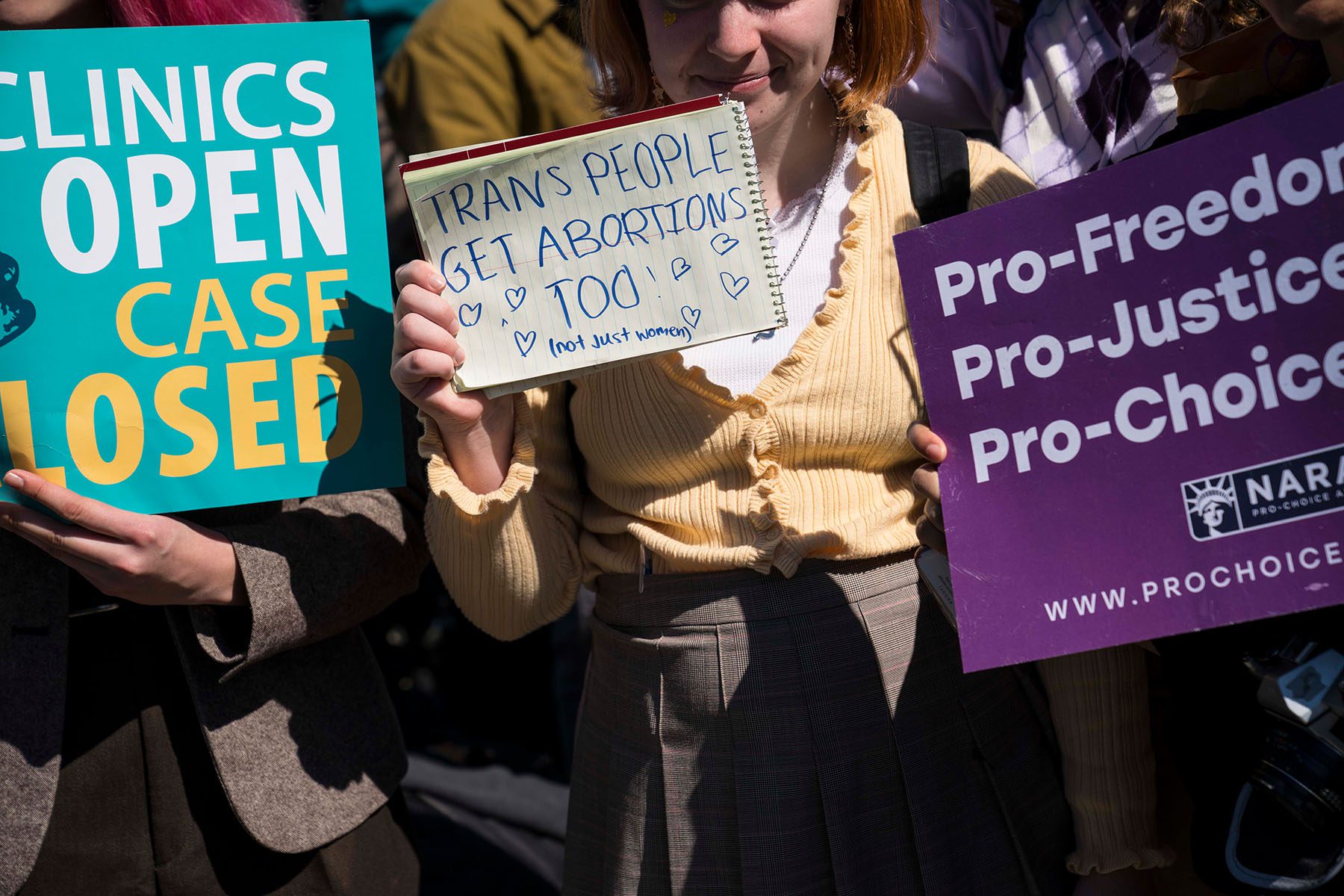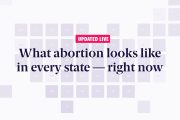The loss of federal abortion protections has launched America into a new reality: The ability to access abortion depends on where you live. Millions of people have been impacted by this shift, but among the most vulnerable are transgender men and nonbinary and gender-nonconforming people. Without the abortion protections provided under Roe v. Wade, this group — already facing discrimination in medical treatment — suddenly are up against barriers that will be insurmountable for many.
“It’s very hard for cis people to understand how scary it is to seek health care as a trans person,” said Quinn Jackson, a trans primary care doctor in Kansas City, Kansas. “And I think that people who haven’t had abortions have no idea how scary it is to seek abortion care, especially in restrictive places. And very, very few people have any understanding of how scary it is to do those at the same time.”
The highest concentration of trans people in the United States live in the South, which is also where some of the most stringent abortion restrictions or bans are in place. But while some people who are seeking abortions will go out of state, others — especially Black trans people and other trans people of color — are often left with few or zero options.
They are more likely to struggle with poverty and job discrimination, and many lack the financial resources to cover the procedure and ballooning costs of travel. As of 2015, nearly one-third of respondents to the U.S. Trans Survey, the most in-depth examination of transgender life in the country, were living in poverty — more than twice the rate of the rest of the country.
The prospect of traveling hundreds of miles to another state to get an abortion, and doing it safely, is daunting — let alone finding a trans-competent abortion provider in a totally new area.
Jamison Green, a former president of the World Professional Association for Transgender Health who has written extensively about the lives of trans men, is worried that Roe being overturned coincides with rising violence targeting trans people, as more states introduce and pass anti-trans bills. Many trans men and nonbinary people already have to seek abortions and reproductive health care in clinics that emphasize all their services are meant for women. Patients are under threat of abuse or harassment for not conforming, Green said.
He’s especially concerned about trans and queer people of color dealing with “a powder keg waiting to explode” as they seek abortions in a post-Roe world — racism, transphobia, homophobia compounding all at once.
“People do get abused in settings where gender is highly policed, and where people can’t possibly conform to a gender expectation,” he said.
Meera Shah, chief medical officer of Planned Parenthood Hudson Peconic in New York and medical director of Whole Women’s Health Alliance in South Bend, Indiana, has heard about many poor experiences that her trans and nonbinary patients have had in the past with their doctors.
“A lot of my transmasculine patients tell me that they are having sex in a way that could result in a pregnancy, and aren’t offered a pregnancy test, they have to request it, oftentimes,” she said. Other patients have told her that past providers didn’t talk with them about their risk for HIV or about the preventive drug PrEP.
Rodrigo Heng-Lehtinen, executive director of the National Center for Transgender Equality, worries that clinics billing their care as “women-only” are already keeping trans people from accessing abortions. When a procedure is only referred to as something for women it makes it tougher to access, he said, whether that comes from just trying to find a welcoming facility, discrimination from a health care provider, or the insurance company turning down coverage.
Heng-Lehtinen pointed to the fact that so few trans people regularly get pap smears to screen for cervical cancer on time as one example: Only 27 percent of trans respondents to the 2015 U.S. Trans Survey did so within that previous year.
“Pap smears are thankfully not stigmatized like an abortion is, but it shows that when a procedure gets coded as being for only one gender and that’s just wrong, that actually doesn’t describe the people who get that service, then it ends up influencing who actually gets it,” he said.
A lack of access, either through state laws or these barriers trans people face within the health care system, could have dire consequences. Several trans men told The 19th that the idea of being pregnant earlier in life would have caused them to consider suicide or would have greatly harmed their mental health. While some trans men choose to get pregnant when starting a family, for others, the psychological conflict stemming from being pregnant when living as a man would be nothing short of unbearable.
Kylar Broadus, founder of the Trans People of Color Coalition, said that fear is personal for many trans men, especially as they encounter high rates of rape and sexual assault.
“If I had had to carry a child, my spirit would have been broken. And I would have considered killing myself. And that was always one of my fears as a young person,” he said.
-
The Latest:
The 2015 U.S. Trans Survey found that nonbinary people and trans men report being sexually assaulted at a higher rate than other LGBTQ+ people. Fifty-one percent of trans men and 55 percent of nonbinary people out of over 27,000 respondents said they had been assaulted in their lifetime.
The assault that many trans men face, alongside discrimination and harassment that aims to invalidate their identities, has not faded over the years, said Broadus.
“It’s just become a pure rape culture out there for trans men in particular,” he said. “This law will be horrific.”
Camden Hargrove’s first concern is how Roe being overturned will affect his daughters. But Hargrove, the national organizing manager at the National Black Justice coalition, is also afraid about what will happen to trans men who are assaulted and can’t access abortion services.
“I’m absolutely terrified about that for all of my trans brothers, and trans people in general,” he said.
The overturning of Roe v. Wade could also put other medical services at risk, multiple experts told The 19th. Whether trans patients are seeking an abortion or primary care, local independent abortion clinics or Planned Parenthood are often the only place — especially outside major cities — to find gender-affirming care.
“For many of us, Planned Parenthood clinics have been lifesavers because their staff have been trained on trans care and nonbinary care,” said Victoria Kirby York, deputy executive director of the National Black Justice Coalition.
Losing gender-affirming care if clinics are forced to close would have an immediate impact, Shah said, noting that Planned Parenthood plans to keep health centers open for services unrelated to abortion care in restrictive states.
“A lot of abortion providers have become a place where trans and nonbinary patients can access hormones, and if those centers are forced to shut down, then those patients could potentially lose a safe, non-judgmental, culturally sensitive place to receive health care,” she said.
Jackson is particularly worried about independent clinics, especially because some data suggests that they — rather than larger networks like Planned Parenthood — have provided the majority of abortions in the country.
“Those clinics are also at a really high risk of closing,” he said.
The health care challenges faced by trans people — especially in reproductive care — are even more difficult for those who are Black, experts told The 19th. Many are mistreated, improperly diagnosed or just not listened to in doctor’s offices, said Hargrove. Others are afraid to go to the doctor after dealing with being misgendered and invasive questions.
“I can foresee so many issues that will really impact trans people, trans men,” said Hargrove. “It’s gonna be a hard road. It’ll be a long fight, but we’re here for it.”
Non-Hispanic Black women are at least three times as likely as non-Hispanic White women to die from pregnancy-related causes, per the Centers for Disease Control and Prevention. Black women’s pain and medical concerns are often outright dismissed by doctors, including during pregnancy, as experts say racism, bias and less access to quality care all contribute to that high maternal mortality rate.
While the same level of data collection for Black trans men and nonbinary or gender-nonconforming people doesn’t exist, experts and advocates believe the same health care disparities are disproportionately harming them — meaning that they will likely be exposed to even more barriers to find adequate care than other trans people.
Grayson Schultz, based in Ohio, works as a care coordinator for LGBTQ+ people across the country seeking health care.
Now that Roe is overturned, Schultz expects Black and Indigenous trans people, and other trans people of color, will be the most harmed as they seek to access reproductive and gender-affirming care.
“If you are trans and become pregnant and you need to access abortion services in the South, your options are really, really limited right now,” he said.








